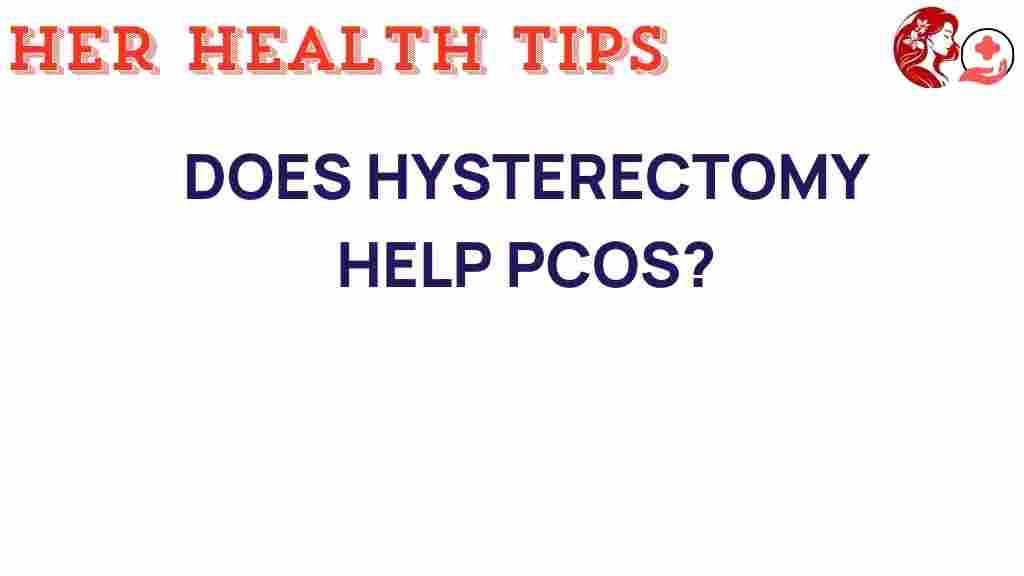Unraveling the Mystery: Does Hysterectomy Help PCOS?
Polycystic Ovary Syndrome (PCOS) is a complex hormonal disorder that affects many women, leading to a range of symptoms including irregular periods, weight gain, and chronic pain. For some women suffering from severe symptoms, the question arises: does hysterectomy help PCOS? In this article, we will explore the relationship between hysterectomy, PCOS, and various treatment options available for women’s health and reproductive health. We will also discuss the role of conditions like endometriosis and the importance of hormonal balance in managing chronic pain.
Understanding PCOS
PCOS is a condition characterized by hormonal imbalances, which can lead to a variety of health issues. Some of the common symptoms include:
- Irregular menstrual cycles
- Excess body hair (hirsutism)
- Acne and oily skin
- Weight gain or difficulty losing weight
- Infertility
The underlying cause of PCOS is not fully understood, but it is believed to involve a combination of genetic and environmental factors. Women with PCOS often experience insulin resistance, which can further complicate their health.
Current Treatment Options for PCOS
While there is no cure for PCOS, there are several treatment options available to manage symptoms effectively. These include:
- Lifestyle Changes: Diet and exercise can significantly improve symptoms and hormonal balance.
- Medications: Hormonal contraceptives, anti-androgens like spironolactone, and medications to manage insulin resistance, such as metformin, are commonly prescribed.
- Fertility Treatments: For those struggling with infertility, treatments like Clomiphene Citrate or assisted reproductive technologies may be recommended.
It’s essential for women with PCOS to work closely with their healthcare providers to tailor a treatment plan that best suits their individual needs.
What is a Hysterectomy?
A hysterectomy is a surgical procedure that involves the removal of the uterus. In some cases, the cervix, ovaries, and fallopian tubes may also be removed. Hysterectomies are typically performed for conditions such as:
- Uterine fibroids
- Endometriosis
- Uterine prolapse
- Certain types of cancer
In the context of PCOS, the decision to undergo a hysterectomy is not straightforward. While some women may consider this surgery due to severe symptoms, it is crucial to understand the implications.
Does Hysterectomy Help with PCOS Symptoms?
The effectiveness of hysterectomy in treating PCOS is a topic of ongoing debate. Here are some key points to consider:
- Symptom Management: Hysterectomy may alleviate certain symptoms such as heavy bleeding or chronic pelvic pain, especially if endometriosis is also present. However, it does not directly address the hormonal imbalances associated with PCOS.
- Hormonal Changes: After a hysterectomy, women experience a significant change in hormonal balance. If ovaries are removed, this can lead to surgical menopause, which brings its own set of challenges.
- Not a Primary Treatment: Hysterectomy is generally not considered a first-line treatment for PCOS. Most healthcare providers recommend exploring other treatment options before considering surgery.
Endometriosis and Its Connection to PCOS
Endometriosis is a condition where the tissue similar to the lining of the uterus grows outside the uterus, causing chronic pain and other complications. Many women with PCOS also suffer from endometriosis, and the two conditions can exacerbate each other’s symptoms. If endometriosis is the primary issue, a hysterectomy may provide relief.
In cases where both PCOS and endometriosis are present, managing the symptoms of endometriosis may be more beneficial than focusing solely on PCOS. Treatment options may include:
- Hormonal therapies to regulate the menstrual cycle and reduce pain
- Laparoscopic surgery to remove endometrial tissue
- Hysterectomy, if conservative treatments fail
Step-by-Step Process: Evaluating Hysterectomy as a Treatment Option
If you are considering a hysterectomy due to PCOS, here’s a step-by-step process to follow:
- Consultation with a Specialist: Speak to a gynecologist or reproductive endocrinologist who specializes in PCOS and women’s health.
- Comprehensive Evaluation: Undergo a thorough evaluation, including hormone level testing, imaging studies, and a review of your symptoms.
- Discuss Alternatives: Explore all available treatment options tailored to your specific symptoms, including lifestyle modifications and medications.
- Assess Risks and Benefits: Understand the risks and benefits of undergoing surgery, including potential impacts on hormonal balance and future fertility.
- Make an Informed Decision: Weigh all factors and make a decision in collaboration with your healthcare provider.
Troubleshooting Tips for Managing PCOS Symptoms
While considering surgery, there are several ways to manage PCOS symptoms more effectively:
- Dietary Changes: Incorporate a balanced diet rich in whole foods, lean proteins, and healthy fats. Avoid processed foods and sugars to help manage insulin levels.
- Regular Exercise: Aim for at least 150 minutes of moderate exercise each week to help maintain a healthy weight and regulate hormones.
- Stress Management: Practice mindfulness, meditation, or yoga to reduce stress, which can exacerbate hormonal imbalances.
- Regular Check-Ups: Keep up with regular medical appointments to monitor your condition and adjust treatments as necessary.
Conclusion
In conclusion, while a hysterectomy may provide relief from certain symptoms associated with PCOS, it is not a universal solution for all women suffering from this condition. The surgery does not directly address the hormonal imbalances that characterize PCOS and should only be considered after exploring other treatment options. Understanding the nuances of both PCOS and conditions like endometriosis is essential for making informed decisions about your reproductive health.
Always consult with a healthcare professional to determine the best treatment options for your unique situation. For more information on managing PCOS, visit ACOG’s PCOS Resource. Your health journey is important, and seeking the right support can lead to improved well-being.
This article is in the category Reproductive and created by HerHealthTips Team
